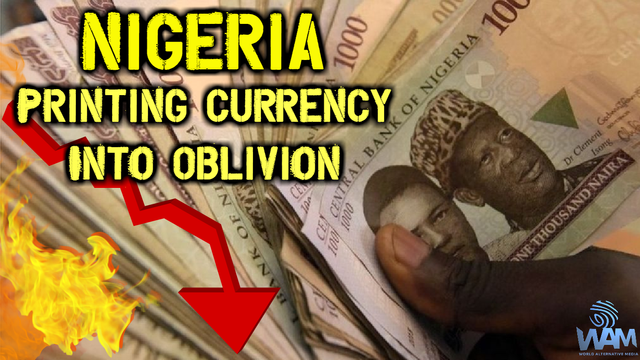Nigeria Is Printing Its Currency Into Oblivion! - How This Is Bankrupting The Nigerian People

In this video, I talk with author and economic analyst John Sneisen about the continued devaluation of the Nigerian Naira as the central bank prints more currency.
The Nigerian central bank (CBN), complete with a pyramid on its roof is printing vast amounts of the Naira to fund its government.
According to Quartz,
"Between December 2013 and April 2017 for instance, the CBN’s “claims on the federal government” went from 678 billion naira to 6.5 trillion naira ($1.8 billion to $17.3 billion)—an almost 10-fold rise. These “claims” are made up of overdrafts, treasury bills, converted bonds and other such lending. For the most part, the issue has remained an obscure one that receives hardly any attention from local media.
But then, a couple of weeks ago, the CBN finally published the personal statements of the Monetary Policy Committee (MPC) members from the July meeting [PDF] and suddenly the alarm bells started ringing. The personal statement of Dr. Doyin Salami, a well-regarded member of the MPC noted for his straight talking, said the CBN was providing a “piggy-bank” service to the federal government."
The inflation rate currently sits at 16.01% which is massive. The country like many countries is largely oil dependent which is something we're seeing in Algeria, Venezuela and in the past Zimbabwe.
At the moment, one Naira equals $0.0028 USD.
We are watching nearly every country in the world print their currencies into oblivion. All fiat currencies eventually revert to their intrinsic values of zero. They always have and they always will.
The constant quantitative easing is incredibly volatile and dangerous. A populace in debt is a populace in servitude. That's exactly where the state and central banking system wants people.
We will continue to cover this issue.
See the FULL video report here:
Stay tuned for more from WAM! Don't forget to Upvote & Follow!
If you like what I do, you can donate to my Bitcoin, Dash or OMG addresses below!
Bitcoin:

Dash:

OMG:

Thank god we have bitcoin to provide an alternative to this madness. I've experienced first hand when my country's currency experienced a 50% (!!) drop in less than 6 months. I hope the crypto world would outgrow the mania (i.e. get rid of 99% of these overvalued ICOs and solve political squabble in bitcoin) and focus on the real threat that is Central Banks.
It's definitely crazy. What country are you from?
Yeah, the worst part is that governments quickly obliged businesses to set prices in the country's currency, so all of a sudden its crisis, 50% inflation and you can now only charge half for your product (in dollar terms). This was in Mozambique by the way. I am now in Europe, but damn did this experience give me a deeper insight into how things are done. Ultimately most politicians are the same, just that African ones are less professional and don't bother covering up what they do hahah.
I have recently just returned from a two week trip to the Ukraine. There the currency has been so devalued that the average citizen has to make due with just $300 a month, an amount barely good enough to pay one's monthly rent let alone anything else.
It's a shame we are in 2017 and people are still suffering because the powers of the country cannot manage the system
Good
Man, Josh. Solid post. Spot on, as usual. I have been thinking about Nigeria a lot lately, since there are a lot of Nigerians in the BTC/Steemit community, I have befriended a few. They are some of the most honorable and fun to talk to people I have met, and I am glad that the Nigerian crypto-community is on the rise. It's sad when BTC has to be seen as a safe-haven against government monetary corruption, but it's good that we have an alternative, at least.
Check out this interesting graph I found, showing how Nigeria is climbing steadily in the Bitcoin world since the beginning of 2016. here
Check it out, they are doing almost 3.5mil USD weekly, just on LBC alone!
The cabals that has been holding Nigeria backward in terms development has always been the central bank. The central bank will deliberately print money in excess and will later recall the excessive cash through the commercial banks at very outrageous interest rate in other to enrich the directors of the central bank, whom are among the highest share holders of the commercial bank.